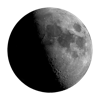IC 293 - Lenticular Galaxy in Perseus
IC 293 is a Lenticular Galaxy in the Perseus constellation. IC 293 is situated north of the celestial equator and, as such, it is more easily visible from the northern hemisphere. Given its B magnitude of 15.7, IC 293 is visible only through long exposure photography.
The image below is a photograph of IC 293 from the Digitized Sky Survey 2 (DSS2 - see the credits section) taken in the red channel. The area of sky represented in the image is 0.5000x0.5000 degrees (30.00x30.00 arcmins).

Celestial Coordinates
Apparent
J2000
Finder Chart
The simplified sky charts below show the position of IC 293 in the sky. The first chart has a field of view of 60° while the second one has a field of view of 10°.


Photometric Information
The following table lists the magnitude of IC 293 in different bands of the electomagnetic spectrum (when available), from the B band (445nm wavelength, corresponding to the Blue color), to the V band ( 551nm wavelength, corresponding to Green/Yellow color), to the J, H, K bands (corresponding to 1220nm, 1630nm, 2190nm wavelengths respectively, which are colors not visible to the human eye).
For more information about photometry in astronomy, check the photometric system article on Wikipedia.
The surface brightess reported below is an indication of the brightness per unit of angular area of IC 293.
Apparent Size
The following table reports IC 293 apparent angular size. The green area displayed on top of the DSS2 image of IC 293 is a visual representation of it.Morphological Classification
IC 293 - Lenticular Galaxy in Perseus is classified as Lenticular (S0-Aa) according to the Hubble and de Vaucouleurs galaxy morphological classification. The diagram below shows a visual representation of the position of IC 293 - Lenticular Galaxy in Perseus in the Hubble de Vaucouleurs sequence.

Credits for the background image: Antonio Ciccolella / M. De Leo / CC BY
Rise and Set Times
Location: Greenwich, UK
Latitude: 51° 28’ 47” N
Longitude: 0° 00’ 00” E
Timezone: Europe/London
IC 293 - Lenticular Galaxy in Perseus is circumpolar and transits at 08:26 UTC (altitude: 79.8°)









